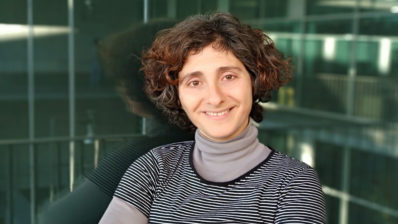This is an overview of the grants, prizes, and recognitions recently awarded to members of the Barcelona Biomedical Research Park (PRBB) to support and highlight their scientific contributions.
ERC Synergy grants
The European Research Council (ERC) is Europe’s leading funding body for excellence in research. One of its grants, the Synergy Grant, promotes collaboration between outstanding researchers.
In this call, out of 548 submitted proposals, 57 projects were awarded, involving 201 researchers. These projects will be carried out at 184 universities and research centers across 24 countries in Europe and beyond. Two of these grants have been awarded to researchers at the PRBB.
Anna Bigas, from the Hospital del Mar Research Institute (HMRIB), will coordinate the MakingBlood project, awarded 10 million euros. Together with the Josep Carreras Leukaemia Research Institute and research groups from Finland, the Netherlands, and the United Kingdom, they will develop and validate protocols and systems to generate laboratory-grown stem cells capable of regenerating patients’ blood.
The other grant is for CeLEARN: Learning in single cells through dynamic internal representations. This project involves the Department of Medicine and Life Sciences (MELIS-UPF), led by researcher Jordi García-Ojalvo. Coordinated by the Max Planck Institute for Neurobiology of Behavior in Germany, and with collaborations in Germany and the United States, the project has been awarded 11.3 million euros. Over six years, they will explore how individual cells can learn and adapt using model organisms.
ERC Consolidator grant
Another type of grants offered by the ERC are Consolidator grants, aimed at supporting outstanding scientists as they establish their independent research teams and develop their most promising scientific ideas. And one of the 21 received in Spain has come to the PRBB. Arnau Sebé-Pedrós, from the Centre for Genomic Regulation (CRG) will use the 2 million euros to map the evolutionary relationships between different animal cell types by studying the primordial dwellers of the seas: jellyfish, corals, and sea anemones.
Sebé-Pedrós is also coordinator of the Biodiversity Cell Atlas project, to which this new ERC-backed project will contribute.
ERC Starting grant
The ERC also offers the Starting Grant, worth 1.5 million euros, for early-career scientists beginning to lead research projects. Noelia Ferruz, recently arrived at the CRG, has secured this grant for ATHENA, a generative artificial intelligence project for protein design.
CaixaImpulse for Innovation
CaixaImpulse for Innovation is a program that fosters the creation of new products, services, and companies in life and health sciences, accelerating their market entry and bringing these innovations closer to patients.
Pablo Villoslada, from HMRIB, leads one of the 29 projects funded. Over the next two years, his team will focus on developing an ultrasound device to stimulate the spinal cord and slow the progression of multiple sclerosis.
Luciano Di Croce (CRG) has also been selected for a project aimed at developing a new therapy for diffuse midline glioma, the most aggressive and lethal pediatric brain tumor.
Two projects from the Barcelona Institute for Global Health (ISGlobal) are also part of this call. José Muñoz and his team will validate Famba, a real-time surveillance platform for emerging diseases. Meanwhile, Claudio Parolo will develop and validate a rapid and cost-effective test for malaria and dengue.
CaixaResearch for Health Research
In this case, CaixaResearch for Health Research aims to identify and support projects with potential value and social impact over a maximum of three years, from basic, clinical, or translational research, with funding of up to one million euros.
Pia Cosma (CRG) leads the development of a synthetic retina to restore vision in cases of blindness caused by retinitis pigmentosa, a rare degenerative disease.
Another participating project is led by Luis Serrano (CRG) in collaboration with the HMRIB and coordinated by Toni Celià-Terrassa. They will analyze the feasibility of using bacteria-based therapy to combat lung metastasis.
Grants from La Marató
The 2023 edition of La Marató by 3cat, focused on sexual and reproductive health, has selected two projects from the Department of Medicine and Life Sciences (MELIS-UPF) and one from HMRI Barcelona.
Olga Valverde (MELIS-UPF) leads a study on peripartum depression, aiming to identify potential biomarkers for early diagnosis while proposing new therapeutic approaches.
Òscar Vilarroya (HMRI Barcelona) has received €200,000 to study the short and long-term impact of steroid sulfation, involved in various biological processes, during pregnancy and its influence on maternal mental health and the mother-child bond.
And much more…
Many other excellent projects take place at the PRBB each year, thanks to the competitive funding they receive. Among them, we highlight VICTR3, a project that started this fall and is coordinated by Ferran Sanz from MELIS-UPF. With a total budget of 28 million euros (of which 2.5 are for the UPF), the project seeks to reduce by up to 25% the use of experimental animals in the evaluation of drug safety by creating groups of ‘virtual control’ animals.
Academic awards
Rosa Fernández, leader of the Metazoa Phylogenomics Lab at the Institute for Evolutionary Biology (IBE: CSIC-UPF), has won the 2024 National Research Award for Young Researchers in the Ángeles Alvariño category, worth 30,000 euros. The jury recognized her contributions to evolutionary biology and genomics, valuing her academic trajectory and international research leadership.
The National Research Awards are the most prestigious scientific recognition in Spain. This edition was the first to implement gender parity, with 50% of awards in the senior category and 70% in the junior category going to women. This achievement is due to measures encouraging nominations of female researchers and the participation of the Ministry of Science and Universities’ Women and Science Unit in jury meetings.
Additionally, two PRBB members have recently joined Royal Academies. Tomàs Marquès Bonet, also from IBE, has been appointed a member of the Spanish Royal Academy of Sciences, where he will oversee the Genomics and Evolution area.
Meanwhile, Mara Dierssen, head of the Cellular and Systems Neurobiology research group at CRG, has been elected as a member of the Royal Academy of Medicine of Catalonia.
Congratulations to all!







